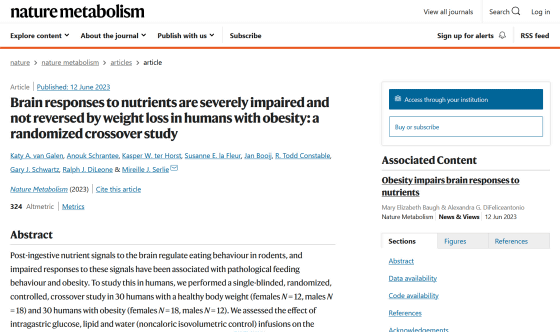Obesity reveals that the ability of the brain to respond to the signal ``I have eaten enough'' is impaired and does not recover even after weight loss

It has been pointed out that obese people tend to eat more calories than they need per day, and that they cannot maintain their weight even after losing weight and are likely to rebound. A new paper by researchers from Yale and Harvard Universities found that 'the brains of obese people are less responsive to gastrointestinal signals that they're getting enough nutrients, and that ability doesn't recover after weight loss.' ” was shown.
Brain responses to nutrients are severely impaired and not reversed by weight loss in humans with obesity: a randomized crossover study | Nature Metabolism

Diminished brain response to nutrients observed in people with obesity | YaleNews
https://news.yale.edu/2023/06/12/diminished-brain-response-nutrients-observed-people-obesity
Obesity changes the brain, with 'no sign of reversibility,' expert says | CNN
https://edition.cnn.com/2023/06/12/health/obesity-changes-brain-wellness/
According to the World Health Organization (WHO), more than 4 million people worldwide die from obesity-related diseases each year, so understanding the biological factors that influence obesity is critical. is. A paper published in January 2023 showed research results that `` if mice continue to eat a high-fat diet, the brain function that regulates calorie intake is destroyed '', but nutrient signals in humans There remains much that is not understood about the transmission of
Continuing a high-fat diet may destroy the brain's ability to regulate calorie intake - GIGAZINE

Therefore, a research team led by Mireille Surly, an endocrinology researcher at Yale University, actually found 28 subjects with a normal body mass index (BMI) of 25 or less and obese subjects with a BMI of 30 or more. We recruited 30 people and conducted an experiment.
Subjects participated in three separate experimental sessions. The day before the session, all subjects ate the same meal at home and did not eat anything until the next morning when the feeding tube was inserted. The research team sent either `` water with sugar (glucose) '', `` water with lipid '', or `` plain water '' directly to the subject's stomach through a feeding tube, and fMRI and single-photon emission tomography for changes in brain activity. Observed for 30 minutes using (SPECT) .

The results showed that in normal-weight subjects, either sugar or fat delivered to the gastrointestinal tract decreased activity in a brain region called
In addition, the release of dopamine was confirmed at the same time as striatal activity decreased, indicating that the brain's reward center was also activated. 'We were interested in the striatum,' Surley said. It makes sense because there is no need,' he commented.
In obese subjects, on the other hand, only sugar caused changes in brain activity, whereas fat did not alter brain activity or dopamine levels. Experts say the discovery is very interesting. As for the reason, I. Sadaf Farooqi of the University of Cambridge, who was not directly involved in the study, said, ``The reason why you want to eat hamburgers instead of broccoli is that the fat contained in hamburgers is biologically better for your brain. Because it shows a reaction,' he said.

In addition, the research team put obese subjects on a 12-week weight loss program to lose at least 10% of their body weight before repeating the experiment. However, despite the weight loss, the obese subjects' brains remained unresponsive to fat.
'Nothing changed. My brain didn't feel full or satisfied. You might say three months isn't enough, or weight loss isn't enough.' 'But this finding may explain why some people lose weight back years after successfully dieting.'
The results of this study do not clarify when the brain changes and loses the ability to sense fat as weight increases, and it also eliminates the possibility that genes influence the brain's response to specific nutrients. I can't finish it. Therefore, further research is necessary to properly interpret the research results.
'The belief that the solution to weight gain is to eat less and exercise more, and not because you lack the willpower, is too simple to be true,' Surley said. 'I think it's important for people to know that brain problems can prevent them from eating less.'

Related Posts:







